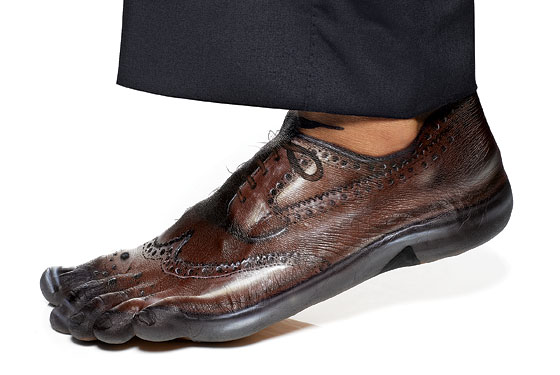
It took 4 million years of evolution to perfect the human foot. But we’re wrecking it with every step we take.
Walking is easy. It’s so easy that no one ever has to teach you how to do it. It’s so easy, in fact, that we often pair it with other easy activities—talking, chewing gum—and suggest that if you can’t do both simultaneously, you’re some sort of insensate clod. So you probably think you’ve got this walking thing pretty much nailed. As you stroll around the city, worrying about the economy, or the environment, or your next month’s rent, you might assume that the one thing you don’t need to worry about is the way in which you’re strolling around the city.
Well, I’m afraid I have some bad news for you: You walk wrong.
Look, it’s not your fault. It’s your shoes. Shoes are bad. I don’t just mean stiletto heels, or cowboy boots, or tottering espadrilles, or any of the other fairly obvious foot-torture devices into which we wincingly jam our feet. I mean all shoes. Shoes hurt your feet. They change how you walk. In fact, your feet—your poor, tender, abused, ignored, maligned, misunderstood feet—are getting trounced in a war that’s been raging for roughly a thousand years: the battle of shoes versus feet.
Last year, researchers at the University of the Witwatersrand in Johannesburg, South Africa, published a study titled “Shod Versus Unshod: The Emergence of Forefoot Pathology in Modern Humans?” in the podiatry journal The Foot. The study examined 180 modern humans from three different population groups (Sotho, Zulu, and European), comparing their feet to one another’s, as well as to the feet of 2,000-year-old skeletons. The researchers concluded that, prior to the invention of shoes, people had healthier feet. Among the modern subjects, the Zulu population, which often goes barefoot, had the healthiest feet while the Europeans—i.e., the habitual shoe-wearers—had the unhealthiest. One of the lead researchers, Dr. Bernhard Zipfel, when commenting on his findings, lamented that the American Podiatric Medical Association does not “actively encourage outdoor barefoot walking for healthy individuals. This flies in the face of the increasing scientific evidence, including our study, that most of the commercially available footwear is not good for the feet.”
Okay, so shoes can be less than comfortable. If you’ve ever suffered through a wedding in four-inch heels or patent-leather dress shoes, you’ve probably figured this out. But does that really mean we don’t walk correctly? (Yes.) I mean, don’t we instinctively know how to walk? (Yes, sort of.) Isn’t walking totally natural? Yes—but shoes aren’t.
“Natural gait is biomechanically impossible for any shoe-wearing person,” wrote Dr. William A. Rossi in a 1999 article in Podiatry Management. “It took 4 million years to develop our unique human foot and our consequent distinctive form of gait, a remarkable feat of bioengineering. Yet, in only a few thousand years, and with one carelessly designed instrument, our shoes, we have warped the pure anatomical form of human gait, obstructing its engineering efficiency, afflicting it with strains and stresses and denying it its natural grace of form and ease of movement head to foot.” In other words: Feet good. Shoes bad.
More.

No comments:
Post a Comment